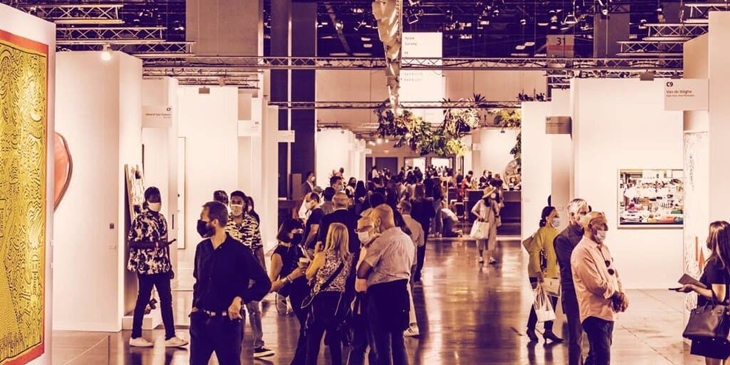
Over the last year, NFTs have kicked down the doors of the art world, making superstars of hitherto-unknown artists like Beeple, pplpleaser and FEWOCiOUS, and grabbing headlines with multimillion-dollar sales of CryptoPunks, Bored Apes and Art Blocks.
To date, the reception from the wider art community has been mixed. While venerable institutions like Christie’s and Sotheby’s have enthusiastically embraced NFTs, and established artists like Damien Hirst have experimented with them, many in the art establishment remain somewhat sniffy.
One thing the art world can’t do now, though, is ignore NFTs—if their invasion of Art Basel Miami is anything to go by.
This year, the crypto set descended on the city to showcase their works and network with athletes, art dealers, famous artists and musicians, and mingle with industry-leading galleries and museums. The hype around NFTs in Miami stood in marked contrast to their muted presence at London Art Week just months earlier.
Here’s what caught Decrypt’s eye at the event.
Ross Ulbricht’s NFTs from prison
During Art Basel, Ross Ulbricht, the founder of Silk Road, who is currently serving more than two life sentences in a Florida prison for his role in the site, released his genesis NFT collection.
The work consisted of paintings made in prison, writings, and an animation of life on the inside, and was released with the support and assistance of SuperRare and curated by Entoptic. The NFTs were soon snapped up by the newly-formed FreeRossDAO, set up to “free Ross, advance prison reform, and share Ross's work with the world and give everyone a unique opportunity to own a piece of it.”
Ross’s mother, Lyn Ulbricht, hopes her son’s NFT will remind the world of the contributions of tech entrepreneurs, even those who sometimes skirt the letter of the law. “My son believed in the non-aggression principle of free interaction,” she told Decrypt. “I think the government, in prosecuting my son to such a cruel extent, has made him a scapegoat in its fear of Bitcoin.”
NFTs come out to party
But in Miami, even good social causes came with a party.
With the NFT market booming, DJ Khaled, never one to miss out on a trend, was seen spotted rocking the mic at an event hosted by Gemini, the crypto firm founded in 2014 by the Winklevoss twins. “Miami balls so hard!” Khaled screamed at one point. it certainly does, especially when you’re getting that Winklevoss money.
Pitbull, meanwhile, took the stage at a party hosted by Tezos-powered music NFT platform OneOf. And at a "Probably Nothing" party hosted by Gary Vaynerchuk and Coinbase, photographs of hot NFTs like Bored Apes, CryptoPunks, Cool Cats, and Doodles lined the digital wall displays as Marshmello played a DJ set.
Olive Allen, a pioneer of the crypto art movement and a strong voice for equality in the industry, had a busy week in Miami. In addition to presenting her work in the Zaha Hadid Studio designed metaverse in Galerie Nagel Draxler’s booth at Art Basel, she also took part in a sale offered by Christie’s of a new work entitled “Hopes for a Better Future,” which pondered the invisibility of women in the crypto and NFT space. “Women make up less than 5% of NFT sales,” she said.
Using her voice and platform in Miami, Allen strongly advocated for more to be done when it comes to access and equality in the space.
Another NFT creator making waves was Armenian feminist performance artist Narine Arakelian, who released an NFT in Miami that included her eggs, telling Page Six she hopes they will be donated to a couple trying to conceive.
Outside the convention center, a new work by artist Mario Klingemann, which consisted of an interactive AI algorithm, allowed visitors to create unique self-portraits and mint them onsite.
The Aorist marketplace also launched an exhibition of environmentally conscious art, offering NFTs by artists such as Jonas Lund, Joanie Lemercier and Nancy Baker Cahill, the proceeds of which went to support the ReefLine, a seven-mile underwater sculpture off Miami’s coast.
Miami: crypto city
In a way, the NFT takeover of Art Basel was the latest evidence that Miami has truly become a crypto haven. The city is now among the most crypto-friendly jurisdictions in America, which made Art Basel’s NFT coming out party all the more popping. The city’s mayor, Francis Suarez, has personally bought Bitcoin and Ethereum and welcomed blockchain entrepreneurs to the city en masse.
Speaking to CBS Miami, the mayor said, “This is the first time that Art Basel has taken on this digital footprint. I’ve been saying this is going to be the largest sale of NFTs in the history of humanity."
The entire week suggested that the crypto art market is booming, but all of this is happening as part of a wider cultural shift, some say.
Sofiane Delloue, a social entrepreneur and founder of the cultural marketplace Newcoin protocol, said that the art market has been slow to embrace crypto, but now artists and the art market are coming to terms with how technology is shifting the playing field towards decentralization and Web3.
“With the rise of Web3 it is now the crypto investors who define good taste, and the NFT space tends to over-represent the crypto culture in the same way YouTube or Instagram have their own influence over content,” Delloue told Decrypt. “The art market, like social media giants Facebook and Instagram, is in dire need of correction, and, dare I say, complete disruption altogether.”
If Art Basel Miami was anything to judge things by, the disruption is just getting started.
